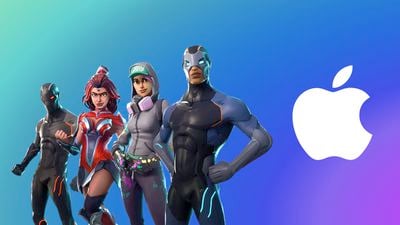The year-long dispute between Epic Games and Apple reached a milestone with Yvonne Gonzalez Rogers delivering a middle-of-the road verdict that isn't quite what Epic Games or Apple wanted.

Apple will not be required to support third-party app stores as Epic Games pushed for, but Apple will have to let developers offer "buttons, external links, or other calls to action" to direct customers to in-app purchase alternatives.
In a statement on Twitter, Epic Games CEO Tim Sweeney said that the company was not happy with the verdict, and at the current time, there are no immediate plans for Fortnite to return to the App Store. Sweeney said that today's ruling "isn't a win" for developers or consumers.
Fortnite will return to the iOS App Store when and where Epic can offer in-app payment in fair competition with Apple in-app payment, passing along the savings to consumers. — Tim Sweeney (@TimSweeneyEpic) September 10, 2021
He also said that Fortnite will return to the App Store when Epic can offer "in-app payment in fair competition with Apple in-app payment," which is unclear.
At the current time, the specifics of the judge's ruling are unknown and the exact parameters of what Apple is required to provide have yet to be established. How the ruling is interpreted and what's ultimately implemented in terms of alternative payment methods remains to be seen. The ruling, for example, does not prevent Apple from requiring developers to support in-app purchases, it simply calls for Apple to also allow for other payment methods.
What's clear, though, is that Fortnite will not immediately be returning to the App Store, and Fortnite's return isn't even up to Epic. The judge's ruling makes it clear that Epic Games violated its contract with Apple, and that Apple's decision to terminate Epic's developer account was "valid, lawful, and enforceable."
Apple is under no obligation to allow Fortnite back into the App Store, and further, the injunction preventing Apple from banning the Unreal Engine developer account has ended. Apple is well within its rights to remove Epic's access for Unreal Engine development and distribution.
Apple's termination of the DPLA and the related agreements between Epic Games and Apple was valid, lawful, and enforceable, and Apple has the contractual right to terminate its DPLA with any or all of Epic Games' wholly owned subsidiaries, affiliates, and/or otherentities under Epic Games' control at any time and at Apple's sole discretion.
Epic Games also needs to pay Apple 30 percent of the $12 million that it brought in while offering the direct payment option that was in violation of Apple's App Store rules.
Though Epic is unhappy with the decision, other companies that have been in disputes with Apple support the ruling. Spotify legal chief Horacio Gutierrez said that Spotify is "pleased" with the finding while also calling for legislation to further address Apple's anti-competitive conduct.
"We are pleased with Judge Yvonne Gonzalez Rogers' finding that Apple engaged in anti-competitive conduct and has permanently prohibited their anti-steering provisions. This and other developments around the world show that there is strong need and momentum for legislation to address these and many other unfair practices, which are designed to hurt competition and consumers. This task has never been more urgent."
Though Apple did not score a total win, Apple lawyer Kate Adams told members of the media that the ruling was a "resounding victory" that validates the App Store business model. Apple's official statement highlights the anti-trust portion of the ruling, which went in Apple's favor. Apple has yet to comment on the outside payment requirement.
Today the Court has affirmed what we've known all along: the App Store is not in violation of antitrust law. As the Court recognized 'success is not illegal.' Apple faces rigorous competition in every segment in which we do business, and we believe customers and developers choose us because our products and services are the best in the world.
Epic Games plans to appeal the parts of the ruling that it does not agree with, and Apple too will likely submit an appeal to push back on the anti-steering requirements the judge has enacted. Apple's lawyers told members of the media that they're still analyzing the judge's decision.
As of right now, Yvonne Gonzalez Rogers has given Apple 90 days to comply with her ruling and allow developers to add links and buttons to direct customers to alternative payment methods. Apple has sort of already taken steps toward the implementation of such a system with its announcement earlier this month that said "reader" apps could offer a link for account signups outside of the App Store.























